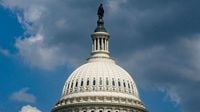Washington, D.C. — On July 2, 2025, the United States House of Representatives grappled with a high-stakes vote on President Donald Trump’s signature legislative package, informally known as the "One Big Beautiful Bill." The sprawling, multi-trillion-dollar tax and spending cuts bill, which narrowly passed the Senate just a day earlier with Vice President JD Vance casting the tie-breaking vote, has ignited fierce debate and division within the Republican Party and across the Capitol.
House Speaker Mike Johnson, a Louisiana Republican, expressed cautious optimism as lawmakers wrestled with the bill’s future. Speaking to reporters, Johnson said, "Making progress. I mean, good conversations and I think we can -- I'm hopeful we can proceed tonight and get this done." He acknowledged the complexity of the legislation and the diversity of interests among House Republicans, noting, "When you have a piece of legislation that is this comprehensive and with so many agenda items involved, you’re going to have lots of different priorities and preferences among people because they represent different districts and they have different interests." Despite these challenges, Johnson remained confident about the path forward, stating, "I feel good about where we are and where we're headed." The Speaker was actively engaged in discussions with both conservative hardliners and swing-district Republicans, as well as coordinating closely with President Trump, who has been personally lobbying holdouts.
The bill itself aims to ramp up spending for border security, defense, and energy production, while extending trillions of dollars in tax cuts. However, these increases are partially offset by substantial cuts to health care and nutrition programs, including Medicaid and the Supplemental Nutrition Assistance Program (SNAP). These cuts represent the largest downsizing of the federal safety net in decades, a fact that has fueled considerable opposition.
Republican leaders face a razor-thin margin for passage. With all members present and Democrats united in opposition, Republicans can afford to lose no more than three votes. The situation was further complicated by severe weather across the East Coast, which delayed flights and made it difficult for some lawmakers to reach Washington in time. Speaker Johnson noted that weather was a "wild card" in the vote’s timing, hoping for a final vote on July 2 or at the latest July 3.
The House Rules Committee advanced the Senate’s changes to the bill in a narrow 7-6 vote after an almost 12-hour meeting, with conservative Republicans Ralph Norman of South Carolina and Chip Roy of Texas joining Democrats in opposing the measure. These lawmakers, along with others in the House Freedom Caucus, have expressed deep reservations about the Senate’s version, particularly its relaxed energy tax credit measures, increased deficit spending, and Medicaid provisions.
Chip Roy voiced his frustration, stating, "It’s not ‘take it or leave it.’ I don’t need take-it-or-leave-it legislating. How about we send it back to him? We say, ‘Take it or leave it,’ all right? So the Senate doesn’t get to be the final say on everything." Similarly, Ralph Norman described the Senate changes as "unconscionable," pledging to vote against the bill until it better reflects conservative priorities. Kentucky Republican Thomas Massie, the sole House Republican consistently opposing the bill on deficit grounds, declared he intends to stand firm, asserting, "They’re just afraid of Trump and the backlash that would ensue if he called them out." Massie highlighted his own political resilience, noting he has developed "Trump antibodies" after surviving multiple attacks from the former president.
Despite these holdouts, some Republicans have shifted toward supporting the bill. Ohio Representative Warren Davidson, who voted against the bill in May, announced his support on social media, calling the bill "not perfect, but the best we’ll get," citing wins in border security, tax policy, and work requirements for food stamps and Medicaid. Tennessee’s Tim Burchett, a key GOP holdout, moved closer to a yes vote after a two-hour meeting with Trump at the White House, describing the discussion as "very productive." South Dakota’s Dusty Johnson echoed optimism, declaring that "Donald Trump is a closer." Other Republicans, including Nebraska’s Don Bacon, backed the bill despite concerns that Medicaid cuts could be politically damaging in the midterms, prioritizing tax cuts and defense funding.
President Trump has been actively engaged in rallying support, hosting meetings with both moderate and conservative Republicans at the White House. His public schedule on July 2 was deliberately left open to accommodate these discussions. Trump also took to Truth Social to pressure GOP members, urging them not to "let the Radical Left Democrats push you around," and emphasizing, "We've got all the cards, and we are going to use them." He highlighted June’s low border crossing statistics as a reason to pass the bill, stating, "All we need to do is keep it this way, which is exactly why Republicans need to pass THE ONE, BIG, BEAUTIFUL BILL." House Majority Leader Steve Scalise praised Trump as "our best closer," underscoring the president’s pivotal role in securing votes.
The legislative process itself was marked by delays and procedural battles. The House floor remained open for several hours as Republican leaders struggled to corral enough votes to advance the bill. A procedural vote was held open for over four hours, with members huddling in meetings and the White House Office of Management and Budget Director Russell Vought joining discussions. Democrats actively sought to delay proceedings by submitting amendments, with Minority Leader Hakeem Jeffries and other Democratic leaders vowing to "do everything" to stop the bill. Jeffries condemned the legislation as a "massive betrayal of the American people," while Rep. Alexandria Ocasio-Cortez slammed it on the House floor as a "tax break" for billionaires that would make Americans "sicker and poorer." Democrats called on at least four Republicans to join them in opposition, naming specific GOP members they saw as vulnerable to pressure.
North Carolina’s Democratic Governor Josh Stein urged his state's House delegation to "press pause" on the bill, warning of its "immediate and long-term threats" to Medicaid, SNAP, and energy and manufacturing tax credits. Sen. Thom Tillis, a Republican from North Carolina who voted against the bill in the Senate, announced he would not seek reelection in 2026. Meanwhile, Rep. Greg Murphy of North Carolina remained undecided as the vote approached.
Beyond the domestic policy bill, President Trump announced a new trade deal with Vietnam, raising import duties to 20% and up to 40% for goods transshipped through Vietnam as a workaround to tariffs on China. In exchange, Vietnam agreed to open its entire market duty-free to U.S. goods. Trump touted the potential for increased SUV sales to Vietnam, highlighting untapped market opportunities.
As the House prepared for the critical votes, the stakes could not have been higher. The bill represents a defining moment for the Republican Party’s agenda, balancing ambitious tax cuts and national security spending against historic cuts to social safety nets. The narrow margins, internal party divisions, and fierce Democratic opposition have made the outcome uncertain. Yet, with Speaker Johnson and President Trump working the floor and the White House, the GOP leadership is pushing hard to deliver the bill to the president’s desk before the July 4 deadline.
Whether the "One Big Beautiful Bill" will clear these hurdles remains to be seen, but the drama unfolding on Capitol Hill underscores the complexities of governing in a deeply divided Congress and the high stakes of budget and policy decisions that will shape the nation’s future.





